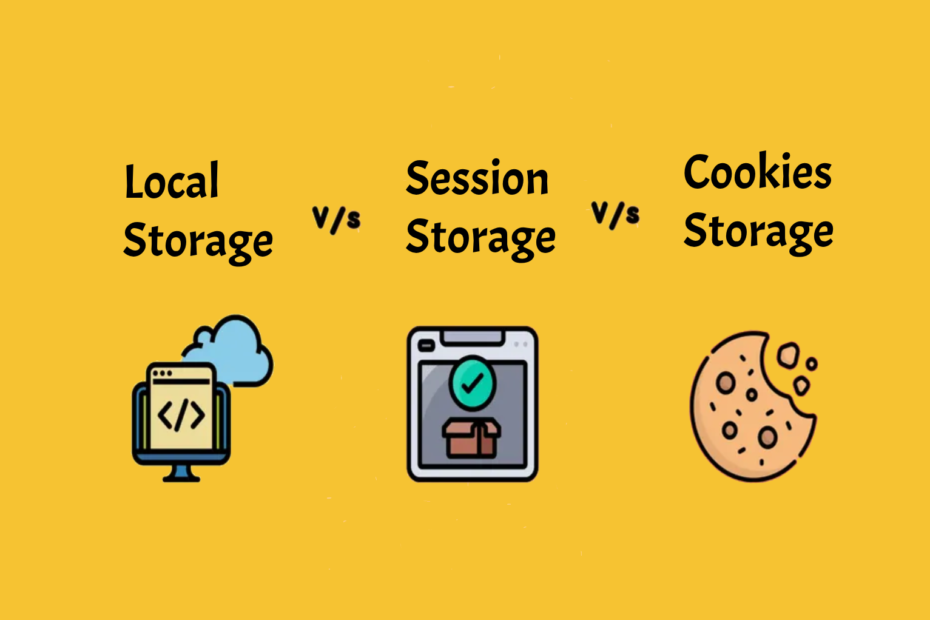Introduction
The methods that browsers employ to store data on a user’s device are referred to as web storage. Web applications can store data locally thanks to these techniques, which enables access to the data even when the user is not connected. The many forms of online storage, such as cookies, local storage, and session storage, will be discussed in this article.
What is Web Storage?
Overview of Web Storage Mechanisms
Web storage mechanisms allow websites to save data directly on a user’s device. This data can be used to enhance the browsing experience by remembering user preferences or maintaining sessions.
Evolution of Web Storage
Web storage has evolved from simple cookies to more sophisticated methods like local storage and session storage, which offer increased storage capacity and better security.
Cookies
1. Definition of Cookies
Cookies are small text files stored on a user’s device by a web server. They are used to track user activity, store login information, and personalize the browsing experience.
2. Types of Cookies
There are various types of cookies, including session cookies, persistent cookies, and third-party cookies. Each serves different purposes, from maintaining user sessions to tracking behavior across multiple sites.
3. How Cookies Work
Cookies work by storing data in key-value pairs. When a user visits a website, the server sends a cookie to the user’s browser, which then stores it. On subsequent visits, the browser sends the cookie back to the server, allowing the site to remember the user.
4. Use Cases for Cookies
Cookies are commonly used for session management, personalization, and tracking user behavior for analytics and advertising purposes.
5. Limitations of Cookies
Despite their usefulness, cookies have limitations, including limited storage capacity (4KB), potential security risks, and privacy concerns due to tracking.
Local Storage
1. Definition of Local Storage
Local storage is a web storage mechanism that allows websites to store data persistently on a user’s device. Unlike cookies, the data in local storage does not expire.
2. How Local Storage Works
Local storage stores data in key-value pairs, similar to cookies. However, it offers more storage space (typically around 5MB per origin) and does not automatically expire.
3. Use Cases for Local Storage
Local storage is ideal for storing large amounts of data that need to persist across sessions, such as user preferences, application state, and cached data.
4. Pros and Cons of Local Storage
Local storage offers more capacity and persistence compared to cookies, but it can be misused, leading to performance issues and security risks if not handled properly.
Session Storage
1. Definition of Session Storage
Session storage is another web storage mechanism that stores data for the duration of a user’s session. Once the session ends (e.g., when the browser is closed), the data is deleted.
2. How Session Storage Works
Session storage operates similarly to local storage but with a shorter lifespan. Data stored in session storage is only available within the same session, making it suitable for temporary data.
3. Use Cases for Session Storage
Session storage is commonly used for storing data that needs to be available temporarily, such as form data or session-specific settings.
4. Pros and Cons of Session Storage
Session storage is secure and easy to use, but its temporary nature means it’s not suitable for data that needs to persist across sessions.
Key Differences Between Cookies, Local Storage, and Session Storage
1. Data Persistence
Cookies can be persistent or session-based, while local storage is persistent, and session storage is temporary.
2. Storage Capacity
Cookies have the smallest storage capacity (4KB), while local storage and session storage offer more space (typically around 5MB).
3. Accessibility
Cookies are accessible by both client and server, whereas local and session storage are only accessible by the client.
4. Security Implications
Each storage mechanism has its own security considerations. Cookies are vulnerable to cross-site scripting (XSS) attacks, while local and session storage are safer but can still be compromised if not properly secured.
Best Practices for Using Web Storage
1. Security Best Practices
Always sanitize data before storing it in web storage, use HTTPS to encrypt data in transit, and limit access to sensitive data.
2. Privacy Considerations
Be mindful of user privacy by not storing personally identifiable information (PII) in web storage without proper consent and transparency.
3. Performance Optimization
Avoid overloading storage with unnecessary data, and regularly clean up expired or unused data to maintain optimal performance.
Common Mistakes to Avoid
1. Overusing Cookies
Avoid storing too much data in cookies, as it can lead to performance degradation and increased security risks.
2. Mismanaging Storage Limits
Be aware of storage limits to prevent data loss and ensure your application can handle scenarios where storage space is exhausted.
3. Ignoring Security Risks
Never store sensitive information like passwords or tokens in web storage without proper encryption and security measures.
Real-World Examples
1. Web Applications Using Cookies
Many e-commerce sites use cookies to remember user carts and preferences across sessions.
2. Websites Leveraging Local Storage
News sites often use local storage to cache articles for offline reading.
3. Session Storage in E-commerce
Session storage is commonly used in checkout processes to store temporary data like payment details or shipping information.
Related Articles
Simplify Your Code With These Async/Await Best Practices In JavaScript
Difference Between Promise.All() And Promise.AllSettled()
Laravel Interview Questions And Answers
Frequently Asked Questions
What is the difference between cookies and local storage?
Cookies are primarily used for session management and tracking, while local storage is used for storing larger amounts of persistent data.
Can I clear my web storage?
Yes, users can clear cookies, local storage, and session storage through their browser settings.
Which storage method should I use?
The choice depends on your needs. Use cookies for session management, local storage for persistent data, and session storage for temporary data.
Conclusion
Web storage is a critical component of modern web development, offering different tools for different needs, including cookies, local storage, and session storage.
Understanding the strengths and weaknesses of each storage method helps developers make informed decisions that enhance user experience while maintaining security and performance.






